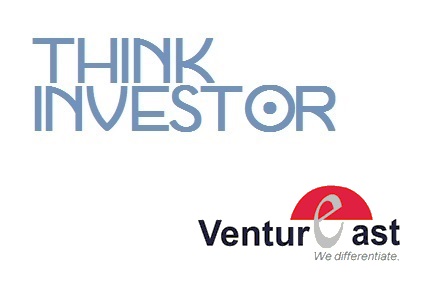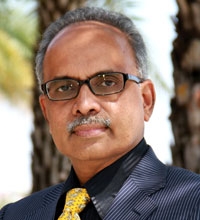ThinkInvestor is iSPIRT and ProductNation’s new initiative to serve as a catalyst between Venture Capital firms, Angels, Angel Networks and Entrepreneurs. It is to go beyond brochure ware and dig deeper into the whole life cycle of a typical investment; from introductions, funding, styles of on-going engagement, to exits. And in the process, capture their views on global and local trends, and the entrepreneurial ecosystem in India.
 Ventureast is an Indian VC fund manager with close to $300 million under management. They have a history of investing in innovative businesses across multiple sectors, and multiple stages of a business – from seed and early to growth stages.
Ventureast is an Indian VC fund manager with close to $300 million under management. They have a history of investing in innovative businesses across multiple sectors, and multiple stages of a business – from seed and early to growth stages.
Guided by the singular credo “We Differentiate, You Win”, Ventureast has enabled over 60 businesses in Technology, Life Sciences and emerging sectors to become leaders in their individual spaces. The company has a proven track record of investments and exits, aided by a strong founding team which has been with Ventureast for over 15 years and who understand the entrepreneurial ecosystem well.
The Ventureast Proactive Fund, Ventureast Life Fund and Ventureast Tenet Fund II feature a wide investor base (Limited Partners) consisting of institutional investors from across the world.
They were in the papers recently when their investment, Little Eye Labs, was acquired by facebook.
ProductNation sat down with Sateesh Andra, Managing Partner, and Dr. Ramesh Byrapaneni, Venture Partner of Ventureast Tenet Fund, for this interview. Here’s what we heard:
What kinds of start-ups are you interested in? What’s your stage of investment and typical investment size?
 Our fund invests exclusively in IP-enabled companies. We are interested in Internet and Mobility related plays. We are very interested in enterprise focused start-ups among these. We are very interested in Healthcare and Healthcare related Information Technology plays also. We are interested in companies that address inefficiencies in areas such as Education and Finance with technology solutions. The filter that we use is that these companies address global opportunities in South East Asia, Europe and the US. We found a gap in the Indian VC market between what Angels can provide start-up companies with and Series A venture investors. In our current fund, we invest up to $1M a company. In our next fund we are planning to increase this to $1.5M to $2.0M per company.Most of our investments happen at the concept level; they understand the concept well, there is a prototype, and some early revenue validation.
Our fund invests exclusively in IP-enabled companies. We are interested in Internet and Mobility related plays. We are very interested in enterprise focused start-ups among these. We are very interested in Healthcare and Healthcare related Information Technology plays also. We are interested in companies that address inefficiencies in areas such as Education and Finance with technology solutions. The filter that we use is that these companies address global opportunities in South East Asia, Europe and the US. We found a gap in the Indian VC market between what Angels can provide start-up companies with and Series A venture investors. In our current fund, we invest up to $1M a company. In our next fund we are planning to increase this to $1.5M to $2.0M per company.Most of our investments happen at the concept level; they understand the concept well, there is a prototype, and some early revenue validation.
How does an entrepreneur get your attention? How does an entrepreneur get in touch with you? What’s the initial process like?
 Entrepreneurs get in touch with us in a variety of ways. We are panel sessions in conferences and some get in touch with us there. We also get introduced to entrepreneurs and start-ups are demo days at accelerators. Sometimes investors in incubatees at these places introduce companies to us. Introductions through our professional links and references are always welcome. Look us up in social media like LinkedIn and Twitter. See who we follow there. We have also engaged with entrepreneurs and start-ups that have come in with a nice relevant email. They are all good people to introduce you to us. Our big expectation is for you to know us as an investor before you pitch us! Out initial process is quick. After an initial meeting we would let you know in an upfront and candid way, whether we would invest or not. We provide candid feedback on why we are not investing. Entrepreneurs may not like it but these are only the reasons why it does not make sense for us.
Entrepreneurs get in touch with us in a variety of ways. We are panel sessions in conferences and some get in touch with us there. We also get introduced to entrepreneurs and start-ups are demo days at accelerators. Sometimes investors in incubatees at these places introduce companies to us. Introductions through our professional links and references are always welcome. Look us up in social media like LinkedIn and Twitter. See who we follow there. We have also engaged with entrepreneurs and start-ups that have come in with a nice relevant email. They are all good people to introduce you to us. Our big expectation is for you to know us as an investor before you pitch us! Out initial process is quick. After an initial meeting we would let you know in an upfront and candid way, whether we would invest or not. We provide candid feedback on why we are not investing. Entrepreneurs may not like it but these are only the reasons why it does not make sense for us.
Let’s say you are interested in exploring a company further? What happens next? What are your typical due diligence efforts? How long does it take for an investment?
We have a very strong team on our side that can evaluate the Product Market fit for the start-up we are looking at collectively. It is fairly important to us. In early stage start-ups creating the product is easy. Achieving Product-Market fit is tough. From a Product Management/Product Marketing perspective, we look at the value proposition and how they address customer requirements. At an early stage, start-ups may not have a crystal ball but we still need to see 12 month metrics; Profit & Loss and Cash Flow projections. They need to have a decent idea about these. We also dive deeper into distribution channels, feet on the street. The initial team is also critical. The timeline for investment decisions vary. Some take only 2 to 3 weeks if they already have a lot of traction. Some take 6 weeks and some take 8 weeks if there is a lot of financial due diligence to be done. Companies are doing pivots take longer. If there are regulatory frameworks involved as it happens sometimes with healthcare investments, it may take much longer.
How hands-on or hands-off are you with your portfolio company? What’s your style of engagement with a portfolio company?
This is a tricky question! We are not the kind of investor that drives from the back seat. We don’t dictate that this is the way it needs to be. We ensure alignment. In one of our healthcare start-up companies, post-operative care after a stay in the hospital was important. We got involved in that case and helped arrange things. We do monitor a simple set of metrics depending upon the company. We monitor the number of product releases, beta customers, etc,.We also monitor how our portfolio companies incorporate feedback they receive. We don’t give the portfolio companies all of the money upfront. They are done in stages and closely track progress they are making. We make introductions, go on cold calls with the portfolio companies once a month. There are quite a few informal meetings along with the formal ones. We engage with quite a few CIOs and do introductions as appropriate. Our style and approaches are different for different companies. There is no single formula.
Let’s talk about your interest in Healthcare and Healthcare IT Companies. Tell us about some recent investments. What kinds of things are you looking for in this area? What excites you in this area?
SmartRX is an investment of ours that serves post-operative care of patients. Usually after operations in hospitals, when patients are leaving for home, prescriptions are gone over and that’s where it ends. It becomes very difficult to make sure that the patients are taking their drugs properly. Doctors find it difficult to communicate after that with patients and vice-versa. SmartRx ensures that periodic messages are sent to the patient; common do’s and don’ts. Patients can also have small consultations back with their doctors through SmartRX. This is focused on the US Healthcare Market and is related to Meaningful Use Stage 1 and 2 of the Healthcare Reform effort going on currently in the US. The founders for this company were with Microsoft in the US, came back and started this company. To us, domain expertise is key, as in Healthcare and Healthcare IT start-ups..
We recently invested in OneBreath, a medical device company. OneBreath makes portable ventilators that have the same functions as expensive high-end ones but at a tenth of the cost. One of the founders is on the West Coast of the US and this is targeted towards the global market. We help portfolio companies get the CE Marking so that they can target Europe and other markets if we think FDA approval for the US market may take long.
We invested in Seclore, an Information Rights Management company incubated at IIT Mumbai. Their solution enables organizations to manage information access policies through the cloud. It enables their clients to manage access to documents across computers and tablets. 50% of their customers are in Europe or the US. It is one of the cool companies to watch for.
HealthHero created a device that resided with the patients, monitored vitals such as Glucose, BP levels etc. Patients can input the readings into these devices, doctors and nurses can analyze this data remotely and get back to the patient if necessary. This is now part of Bosch Telehealth.
We are very excited about the use of Smartphones in healthcare – they are the last mile to patients! They represent a humongous opportunity! The computing power within Android and iOS devices make possible some radical disruptions.
Now, let’s talk about Exits. What do you see coming in this area?
The Nest Acquisition by Google shows how much they value vision. Our belief is that you need to create value for exits. With a little bit of luck and timing this will happen! Exit multiples are very important to accelerate exits in general. The macro trends are very positive! We have seen some exciting exits; Portal Player acquisition by NVIDIA, Qontex, a spin-out from Pramati Technologies was acquired by Adobe , Yasu Technologies, a Business Rules Management System company was acquired by SAP. Healthcare, Pharma and Biotech companies are all seeing momentum right now. We are seeing a lot of investments in cloud based Value Added Services companies; distributed applications and globally relevant!
What about some parting thoughts for entrepreneurs?
Just wanted to reiterate what we are looking for in start-up companies; a strong product management team with strong technical skills, ability to look at things from a customer angle, sales and marketing knowledge, excellent people management skills. We are looking primarily for deep understanding of technology, clear understanding of the customer landscape and excellent program /people management skills!













